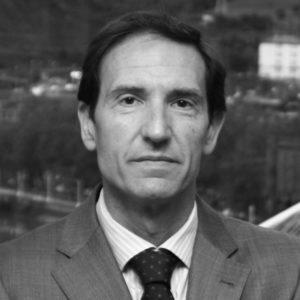José I. Hormaeche, voice of the Sustainable Industry
FEDARENE - Energy Agencies

We often talk about the role of public administrations, regions and cities in advancing the energy transition. But, as the General Manager of a Cluster you mainly work with private entities and the industrial sector. According to you, what is the role of the private sector in this transition?
In my opinion, the private sector has to play (and in fact is already playing) a key role in the energy transition. Firstly, because most of the investments needed to make the energy transition possible will come from private entities and funds. Moreover, the systems and solutions to create a sustainable energy ecosystem are becoming more competitive thanks to the technological innovations and learning curves that industrial companies are achieving throughout the different value chains: wind energy, solar energy, smart grids, electromobility, energy efficiency, . . . The policies and strategies boosted by the public administration are necessary to set the right framework and support measures for the energy transition, but it is the private sector who has to build the business cases and put the investments to work. And after the terrible COVID-19 pandemic crisis we are still suffering, I think we have a unique opportunity to boost the investments in infrastructures and facilities towards the energy transition as one of the main measures to reactivate the economic activity and create high-quality jobs. And once again the role of private initiatives will be key.
The industrial sector and companies working in the energy field are often targeted as polluters and responsible for a significant share of gas emissions. How do you address this challenge in your daily work? Do you try to change mentalities?
My view is that the companies in the energy sector have accepted the challenge and are taking the lead in the energy transition. Most of them are fully committed to align their economic objectives with the social and sustainable development goals, reorienting their strategies around the new energy paradigms: decarbonization, electrification, efficiency. Our mission as a Cluster association is to boost the competitiveness of our members through inter-business cooperation and public-private collaboration. For that purpose we have defined the Strategic Plan for 2022, with the main objective of supporting companies, and very especially the SMEs, to take advantage of the business opportunities that the energy transition are already offering. At the same time we try to launch collaboration initiatives to develop new products and services and to explore emerging markets so that SMEs are ready to compete in the coming years.
But even companies whose core business is dependent on fossil fuels (coal, oil, natural gas) are revising their traditional business lines to reduce the environmental impacts and carbon footprint, at least in the medium-long term. We are also launching Working Groups to help companies in these “traditional energy” sectors to analyze new technologies and market opportunities, to diversify their portfolios and strategies and to make their companies more resilient to the changes that the energy transition will produce.
The Roger Léron Award aims to reward outstanding individuals for their action in the sustainable energy/energy efficiency field at the local or regional level. According to you, what is the most important quality such a person should demonstrate?
I think some of the most important qualities that candidates to the Roger Léron Award should demonstrate are: having a long-term strategic vision and to be action-oriented. Nowadays there is a great social consensus around the need and the relevance of developing a sustainable energy ecosystem. But this has not always been the case. For instance the support to the development of windfarms or solar power plants (in terms of policies, funding or even social support) has been criticized as an inefficient way of wasting efforts and resources for many years. These energy sources have been considered expensive, inefficient and even a threat for the stability and the operation of the electricity grids.
That is why the Roger Léron Award should reward the professional trajectory of those people that had a long-term vision and claimed for the renewable energies and the energy efficiency when it was not so “politically correct”. And the Award could also recognize individuals that were pioneers in the development of projects or the implementation of these technologies at an early stage. Probably many of us can remember some of those people in each country or region that had the right vision and took the lead in the development and the defense of sustainable energies. People that made possible the present situation and perspectives, thanks to their work and inspiration.
What would be the benefits of having a winner coming from the industrial or private sector?
It would be the confirmation of what I mentioned before: the commitment of industry with a sustainable energy future. And it would have a great impact in terms of raising business and social awareness about the efforts and resources that many talented professionals in companies have been devoting to make progress towards a decarbonized economy. It would also help to close the gap between industry and society. In my opinion, this kind of messages about the need (or even the urgency) to react now and boost the energy transition are essential now, more than ever.
Find more information about the Roger Léron Award here.
The post José I. Hormaeche, voice of the Sustainable Industry appeared first on Fedarene.
News published on FEDARENE – energy agencies
Consult the source



